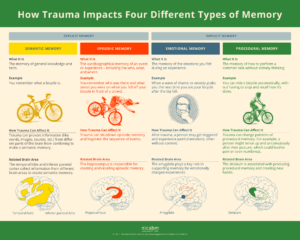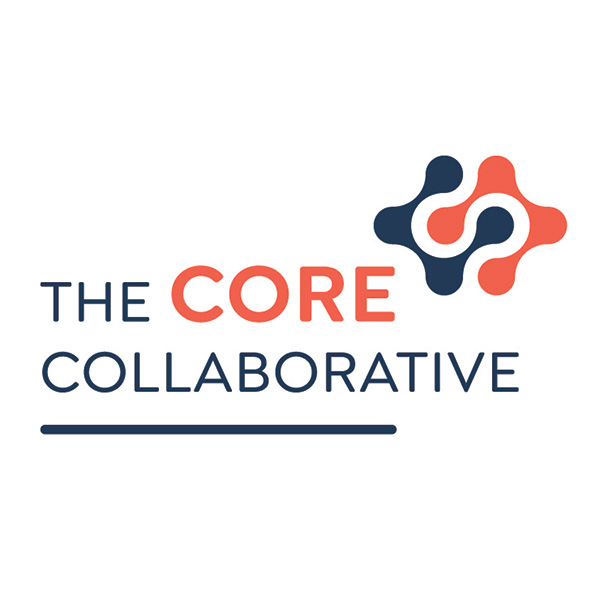Leveraging Trauma Sensitive Memory Strategies
The Core Collaborative Learning Lab
The power of memory is not just in retaining facts, but in shaping our very essence, our dreams, and our future. However, trauma, an intense and distressing experience that overwhelms a student’s capacity to cope, has profound effects on the brain’s memory systems. Supporting students who have been impacted by trauma requires a sensitive and understanding approach and Impact Teams-PLCs who are invested in building collaborative expertise to better support their students.
Trauma can have significant effects on memory, attention, and overall cognitive functioning. Trauma can shut down episodic memory and fragment a sequence of events. In addition, trauma can prevent information (like words, images, sounds, etc.) that originates in different parts of the brain from combining to make a semantic memory.
Check out this graphic from the National Institute for the Clinical Application of Behavioral Medicine regarding how trauma impacts four different types of memory.

Source: National Institute for the Clinical Application of Behavioral Medicine, 2017
Reflection:
- What connections can you make to the information on the graphic?
- How does memory impact learning in your classroom?
Strategies to Strengthen Memory
Our memory is a complex mechanism that encodes, stores, and retrieves information; trauma can disrupt these processes. Here are some strategies to help strengthen memory in students who have experienced trauma:
Classroom Climate:
- Create a Safe and Supportive Environment: Establish a restorative classroom environment. Your classroom environment should be safe, welcoming, and non-judgmental. This is essential for creating a sense of security for students who have experienced trauma. When students feel safe, they are more likely to engage and participate, which can positively impact memory retention.Consider using active listening with students so they feel valued and heard.
- Build Trust and Rapport: Develop strong relationships with your students based on trust and respect through restorative circles. Building rapport helps students feel more comfortable and open, which can lead to improved memory retention and cognitive functioning.
- Provide Predictable Structure: Trauma can lead to a heightened sense of unpredictability and anxiety. Establish a consistent daily agenda and co-construct community agreements and clear expectations in the classroom. Predictable routines can help students feel more safe and focused; this can positively impact memory.
- Incorporate Mindfulness and Relaxation Techniques: Practice mindfulness exercises and breathing techniques to help students cope with stress and anxiety. Deep breathing or meditation can enhance students’ ability to concentrate and remember information. Start class with a relaxation technique or take a brain break.
Instructional Strategies:
- Use Multi-Sensory Learning: Engage multiple senses when teaching. Incorporate visual graphics, hands-on activities, auditory cues, and even movement to enhance memory retention. By engaging different sensory modalities, you provide more pathways for information to be encoded and retrieved.
- Chunk Information: Break down complex information into smaller, manageable chunks. This helps students process and remember information more effectively. This practice reduces cognitive load and allows students to focus.
- Use Repetition and Spaced Practice: Regularly revisit important concepts over time through spaced repetition. This technique involves reviewing information at increasing intervals, which has been shown to improve long-term retention. According to the Visible Learning research, space practice has the potential to accelerate learning.
- Provide Clear Instructions: Present instructions and information clearly and concisely. Avoid overwhelming students with too much information at once. Have students repeat instructions to a partner before getting started and also launch with a Q & A about the instructions.
- Utilize Storytelling and Context: Frame information with stories and contexts that students can connect with. Storytelling can make abstract concepts more concrete and memorable.
- Encourage Academic Discourse and PBL: Engage students in interactive learning experiences that encourage them to actively process and apply new information learned at all levels of rigor (surface-deep-transfer). Activities like discussions, debates, projects, and problem-solving tasks can enhance memory retention.
- Offer Voice and Choice: Allow students to have control over their learning. Providing options via learning menus or choice boards can empower students. Choice can reduce the stress associated with feeling forced into certain activities or methods of learning.
- Address Emotional Well-being: Recognize the emotional impact of trauma and provide opportunities for students to express their feelings in a safe and supportive manner. Emotional well-being is closely tied to cognitive functioning and memory.
Impact Teams-PLCs should build collaborative expertise by partnering with school counselors, psychologists, and social workers to provide comprehensive support for students who have experienced trauma. These professionals can offer additional strategies and interventions tailored to individual students’ needs.
A Journey of Healing
Remember that every student is unique, and the impact of trauma varies from person to person. It’s important to approach each student with empathy, flexibility, and a willingness to adapt your strategies based on their responses and needs. Strengthening memory in young minds is not merely an academic pursuit; it’s a journey of healing, reclaiming control, and constructing a narrative of hope amidst adversity.
“Memory is the treasure house of the mind wherein the monuments thereof are kept and preserved.”
– Thomas Fuller


